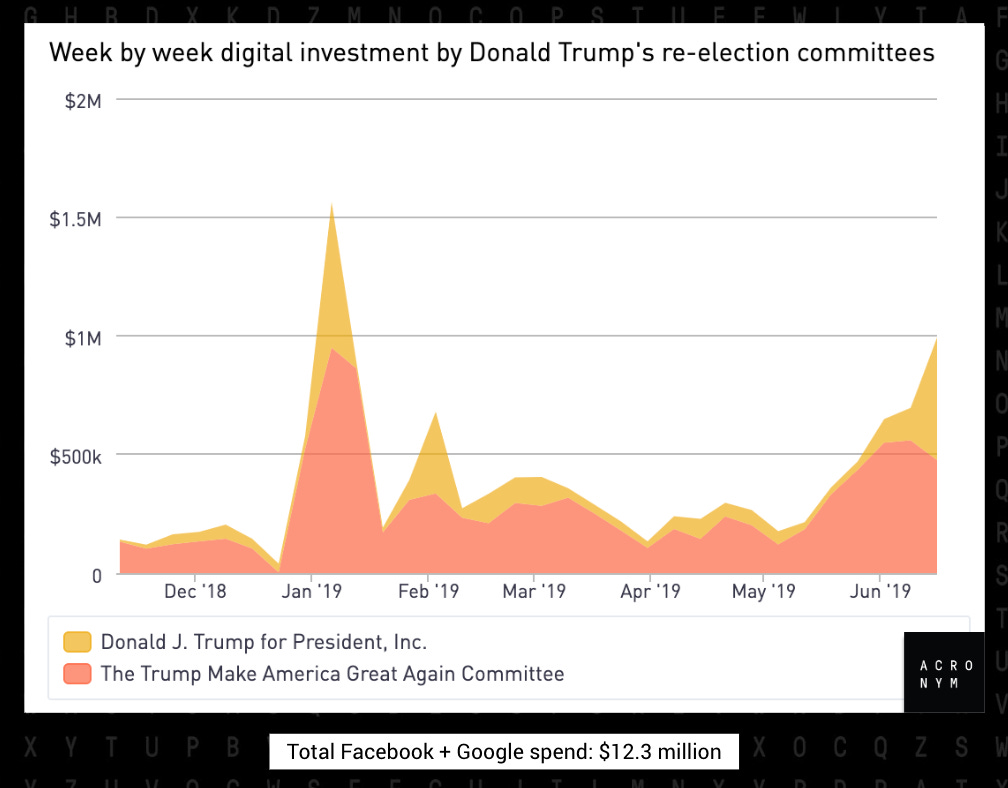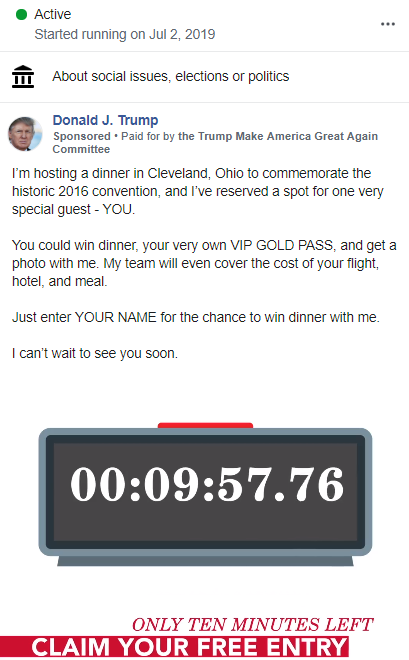Lying is profitable
This week, the Trump campaign announced it raised an impressive $54 million in the second quarter of this year. The Republican National Committee raised another $51 million. Trump's campaign manager, Brad Parscale, says he is on track to raise over $1 billion to support Trump's reelection.
How is Trump raising so much money?
Trump is investing "heavily in online advertising." He has recently been spending nearly $1 million weekly on Facebook and Google ads. Trump's online spending likely to increase as the election nears.

In the week of June 16 to 23, Trump spent $992,421 on Facebook and Google ads. Former Vice President Joe Biden, who leads most Democratic primary polls, spent just $74,540. The top spending Democratic candidate, Senator Elizabeth Warren, spent $166,459.
But it's not just volume that's giving Trump an edge online. Facebook and Google, in violation of their rules, are allowing Trump to run false and misleading ads. With massive tech companies looking the other way, Trump is able to juice his fundraising totals with deceptive tactics.
Only 10 minutes left
On Tuesday and Wednesday, the Trump campaign ran an ad claiming there was only "10 minutes left" to enter a contest for a dinner with Trump later this month. The ad ran for more than 12 hours.

There were multiple variations of this ad running.
This purpose of these ads is to create a false sense of urgency and prompt people to donate to Trump right away. According to Facebook's rules, these ads not permitted on its platform. "Ads, landing pages, and business practices must not contain deceptive, false, or misleading content, including deceptive claims, offers, or methods," Facebook's rules state.
These rules are seldom enforced, however, against the Trump campaign.
Why Trump runs false ads
The Trump campaign gauges the effectiveness of its ads by their ability to prompt immediate action. A Trump campaign official elaborated on the strategy:
A Trump campaign official, who insisted on speaking on background, offered only vague generalities about the current iteration of the digital campaign. He said it was rooted in a Silicon Valley mindset and was akin to high-frequency trading. He described the format of the ads as “direct response marketing”, meaning that they are designed to induce a response – either a donation, an email signup, or a mobile phone signup – from the target.
If your goal is to "induce a response," fake deadlines are very handy. Deadlines create urgency. But Trump has no significant primary opponent and the election is more than a year away. So it is hard to create real urgency. So the Trump campaign is creating fake urgency and hoping no one notices.
Increasing the performance of the ad is key to sustaining high spending online. Advertisers pay to show their ads to more people. If it costs you $100 to reach 50,000 and that generates $75 in contributions, you lose money. If you can double the response rate and get $200 in contributions, you not only are making money but you can rollover the profits and buy even more ads, allowing you to scale your online advertising program indefinitely.
Small changes, like including a fake deadline, can make a big impact on response rates. Campaigns that follow the rules are at a distinct disadvantage.
Facebook responds
A Facebook spokesperson told Popular Information that running an ad with a fake 10-minute deadline does not violate its policies against false and misleading ads. (The spokesperson said the company might refine its interpretation of these rules in the future.)
Facebook said some Democratic candidates -- including Kirstin Gillibrand and Julián Castro -- used similar methods. Those candidates, along with Trump, appear to be violating the plain language Facebook's ban on misleading or deceptive ads.
The motivation for Facebook's lax enforcement is not partisanship -- it's profit. Ads that are rejected don't make the company money. And identifying more violations would require spending more money on people and technology.
Still, the Trump campaign takes advantage of Facebook's permissiveness far more than any other.
A pattern of deception
For three months, Popular Information has exposed numerous false and misleading ads that the Trump campaign has run on Facebook and Google:
Ads on Facebook and Google that deceptively use stock photo models to make it appear that Trump has support from key demographic groups.
Ads on Facebook that falsely claimed there was a midnight deadline to enter a contest for a signed MAGA hat every night for almost two weeks.
Ads on Facebook that falsely claim Democrats want to repeal the Second Amendment.
Ads on Facebook that said Trump was closing the border next week after had already publicly announced he was not closing the border for the next year.
Ads on Facebook and Google that use multiple fake personas for the same endorsement depending on what demographic group is being targeted.
Ads on Facebook that targeted women based on "personal attributes," in violation of Facebook's rules.
Facebook has mostly turned a blind eye to these Trump ads, despite clear violations of the company's stated policies. Only the ads targeting women on personal attributes were taken down by Facebook.
How Facebook reviews ads
I asked Facebook's Rob Leathern, a Facebook executive in charge of its ad products, why no one reviewed Trump's ads before they are published. Here was Leathern's response:
Ads are subject to Facebook's ad review system, which relies primarily on automated review to check ads against our Advertising Policies. We use human reviewers to improve and train our automated systems, and in some cases, review specific ads. We added several thousand reviewers last year as we expanded our coverage of ad review. We know that machines and human reviewers make mistakes, which is why the ad review system and enforcement aren't perfect. This process can never guarantee complete compliance with our ads policies, and it is the advertiser's responsibility to ensure their ads comply with Facebook's Advertising Policies.
Leathern's response helps explain why Facebook is having so many problems with false and misleading ads on its platform. An automated system can do an OK job sniffing out traditional scams. It's as simple as plugging in key phrases like "double your money in two weeks" or "eat this to cure diabetes."
But automated systems struggle to identify the slightly more subtle political cons of the Trump campaign. Facebook seems to be aware of this but is essentially throwing up its hands. Its response to Trump running false ads on Facebook is noting that no review system is perfect and shifting the blame to the Trump campaign.
Thanks for reading!



It's about freaking time big media finally picked up on this story. Congratulations but honestly WTF. That's like what - two months - that Facebook has been thinking they could maybe fly under the radar. Well, excellent reporting and keep at it. Thank you very much for your diligence and integrity.
Congratulations on having your story picked up! Hope you can get more subscribers from the publicity. :-)